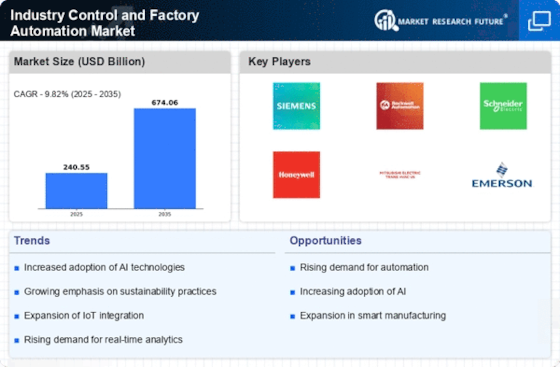Top Industry Leaders in the Industry Controls Factory Automation Market

The Competitive Landscape of the Industry Controls and Factory Automation Market
The symphony of modern manufacturing relies on a conductor – the industry controls and factory automation (ICFA) market. From programmable logic controllers (PLCs) orchestrating robots to intricate sensor networks gathering data witnesses established giants and nimble startups competing to harmonize the complex ballet of industrial production. Let's delve into the key strategies, players, and dynamics shaping this crucial realm.
Key Player:
- Emerson
- ABB
- Siemens
- Schneider Electric
- General Electric
- Rockwell Automation
- Yokogawa
- Honeywell
- Endress+Hauser
- Omron
- Wika
- Fanuc
- Stratasys
- Mitsubishi Electric Corporation
- Dwyer
- 3D Systems
Strategies Adopted by Market Leaders:
- Technological Innovation: Companies aggressively invest in research and development, aiming for faster processors, more efficient control algorithms, enhanced cybersecurity measures, and improved interoperability between different automation systems. Developing novel communication protocols, utilizing artificial intelligence and machine learning, and pushing the boundaries of automation capabilities are key differentiators.
- Diversification and Specialization: Recognizing the market's breadth, established players diversify their offerings, venturing into areas like predictive maintenance solutions and digital twins, while niche players specialize in areas like cybersecurity for industrial networks or robotic vision systems.
- Partnerships and Collaboration: Building partnerships with industrial equipment manufacturers, software developers, and system integrators accelerates market penetration and enables comprehensive automation solutions. Collaborating with research institutions and universities fosters innovation and unlocks new technological advancements.
- Focus on Sustainability: Environmental concerns drive companies to develop energy-efficient automation systems, adopt eco-friendly manufacturing practices, and offer solutions for optimizing resource utilization in factories. Addressing regulatory compliance and customer demand for sustainable practices become crucial differentiators.
Factors for Market Share Analysis:
- Revenue Generated: This straightforward metric reflects a company's market penetration and financial strength.
- Unit Shipment Volume of ICFA Components: Understanding the number of PLCs, sensors, industrial robots, and other automation components sold provides insight into production capacity and market reach.
- Technology Portfolio Breadth and Depth: Analyzing the range of ICFA solutions offered in terms of functionalities, target applications, and software compatibility reveals a company's ability to cater to diverse customer needs.
- Partnerships and Ecosystem Integration: Evaluating a company's partnerships across the industrial automation value chain sheds light on its ability to deliver comprehensive solutions and integrate seamlessly into existing factory infrastructure.
New and Emerging Companies:
The influx of innovative startups is adding fresh instruments to the industrial orchestra. Companies like Tulip.io (USA) and UiPath Inc. (USA) introduce novel solutions like low-code/no-code platforms for industrial automation, enabling rapid deployment and democratizing automation access. They cater to growing needs for user-friendly interfaces and agile automation solutions, especially for smaller businesses.
Industry Developments:
Siemens AG (Germany):
- January 9, 2024- Unveiled a new edge computing platform specifically designed for industrial applications, enabling real-time data analysis and faster decision-making at the shop floor level.
Rockwell Automation Inc. (USA):
- December 5, 2023- Launched a cloud-based AI-powered maintenance solution that predicts equipment failures and optimizes preventive maintenance schedules, reducing downtime and increasing production efficiency.
Schneider Electric SE (France):
- November 9, 2023- Partnered with a leading industrial software developer to offer a comprehensive industrial IoT platform connecting various factory systems and providing real-time production insights.










